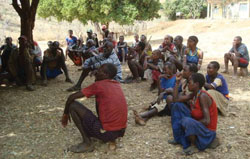
Alemitu found several suspected measles cases among children in her kebele and reported them to the woreda Health Office. The woreda officials sent a team to investigate and confirmed the measles cases in the kebele. In the process, the team came to identify the following facts, based on the information collected from parents:
Health Extension Practitioners are expected to be managers when health issues need to be sorted out in their communities. They have to take on a number of roles in order to complete their tasks. You will remember that interpersonal, informational and decisional roles are all part of what managers do in this instance. For example
Why were these aspects of management important for Alemitu to perform when dealing with this measles outbreak?
As part of the response to the measles outbreak, the woreda team recommended a rapid assessment of the knowledge, attitude and health practices (KAP) of the community on measles management at kebele level. The woreda supported Alemitu in collecting data in a KAP survey. They identified elders, religious leaders and traditional health service providers, as well as parents, as particularly informative subjects to study. They collected data after developing interview questions for individuals and groups. Privacy and confidentiality are key ethical considerations in interviewing people on sensitive topics.
How do you think Alemitu should deal with privacy and confidentiality when interviewing for a KAP survey?
The KAP study resulted in the following findings:
The woreda health officials and Alemitu planned a health education programme (Figure 16.7) targeting the mistaken beliefs identified in the above findings. Particular individuals and groups were identified as the main target for the health education programme. Alemitu identified schools, churches and mosques, community meeting places, kebele meetings, the Health Post and the health centre as suitable settings for health education to take place. The key health education messages were identified to convince the community members that measles is a very serious illness, which can kill a child, or permanently damage its sight and cause severe respiratory problems. A child with measles should be taken to the Health Post or Health Centre for urgent treatment for these complications. Children can be protected from measles by immunization with a single injection of a safe vaccine at nine months of age.

Alemitu's plan included a strategy for monitoring these interventions to assess whether they resulted in changed behaviour concerning measles treatment and immunization. One way in which the monitoring was carried out was to count the number of people (community members, religious leaders, traditional healers, etc.) who attended each of the health education events. Afterwards, Alemitu and the woreda health officials checked to see how many of the unvaccinated children were brought for measles immunization by parents who attended the meetings, or who heard the messages from their neighbours, community leaders and other influential people. They also interviewed community members to ask if their knowledge, attitudes and practices had been changed by hearing the health messages in the campaign.
The results of the evaluation were good. The campaigns under Alemitu's leadership were shown to be very effective. Within two years the measles immunization coverage in the kebele was found to have increased to 96%. There were only five cases of measles among unvaccinated children and all the parents quickly brought the sick child for treatment. Through her work Alemitu set up control of the project by establishing what was going on at the beginning and working through to establish how things had improved. For the success she achieved in her work, the community members and woreda Health Office recognised Alemitu as a 'Change Agent' in her community.
Now you have read about Alemitu's work on immunization and the measles outbreak, you can see how she has been engaged in health management. You will remember from Study Session 2 that the key functions of management are: planning, organising, leading, coordination, monitoring and control. You will recall too that interpersonal, informational and decisional activities are required of someone undertaking a management role.
Look back through this extended case study and note the places where these key management functions are mentioned (they have been highlighted in bold). Briefly describe how Alemitu undertook these tasks as part of her role as a Health Extension Worker.